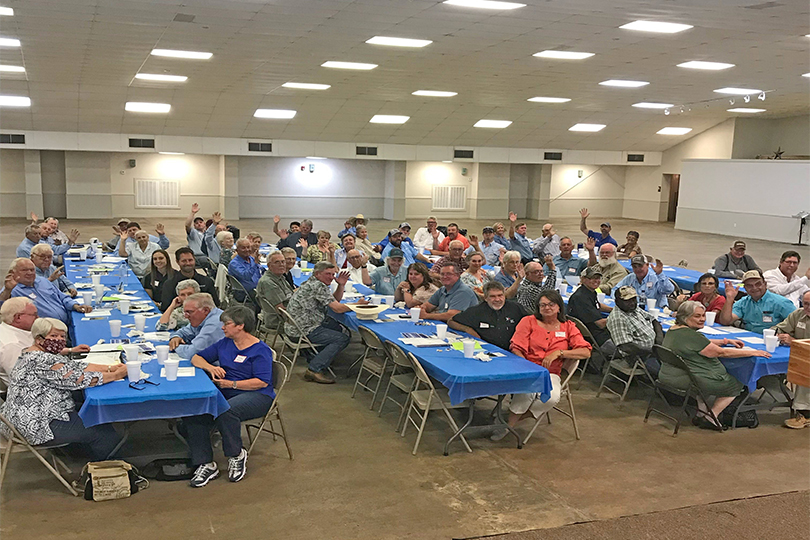By Julie Tomascik
Editor
Cattle markets, property taxes, foreign ownership of agricultural land and President Biden’s tax proposals were among the topics discussed at Texas Farm Bureau (TFB) Policy Development meetings across the state.
Policy Development meetings are part of the process to create the organization’s road map for the upcoming year, allowing members to surface and discuss potential policy changes.
“Policy development is the way members speak through Farm Bureau on issues that affect the farm, ranch and rural way of life,” Brant Wilbourn, TFB associate director of Commodity and Regulatory Activities, said. “As a grassroots organization, Farm Bureau policy starts with our members, and their policies guide the state and national organization.”
About 700 county leaders representing nearly 150 counties were in attendance at the district meetings.
Many discussions centered on the beef supply chain and cattle markets.
The disruptions began in the summer of 2019 when a fire broke out inside a large Kansas beef packing plant, halting production for weeks. The COVID-19 pandemic began a few months later and the cyberattack on JBS in 2021 have all exposed the industry’s dependence on a consolidated beef packing system throughout the U.S.
These supply and production interruptions within the cattle processing plants have led to wide differences in the value of cattle compared to beef.
“Price transparency and competitive bidding on market-ready cattle are high on the priority list for members all across the state,” Wilbourn said. “The low calf prices at the ranch, combined with record high margins between packer sales of beef and their purchase prices of live cattle, were the driving force behind the added scrutiny of cattle and beef markets over the last couple of years.”
Property owners noted property taxes continue to increase and stressed the importance of maintaining agricultural use valuation.
“Property taxes and ag use valuation were brought up at nearly every district meeting,” Wilbourn said. “Members want to make sure that ag use valuation continues for production agriculture. Otherwise, taxes at market value would drastically impact the bottom line of farms and ranches.”
Foreign ownership of agricultural land continues to grow. A recent foreign agricultural land holdings report by the U.S. Department of Agriculture (USDA) shows China holds about 192,000 acres, or $1.9 billion worth of U.S. farmland.
Owners from other countries also have a large stake in American farmland. At the end of 2019, USDA data showed 35 million acres, or 1.5% of all U.S. land, were owned by foreign interests.
“Members shared concerns over the growing number of acres being purchased by foreign countries and investors, like China, and their ability to participate in USDA programs,” Wilbourn said. “They noted food production is a national security issue, and foreign ownership of land can impact that.”
President Joe Biden’s plans to raise capital gains and estate taxes, as well as repeal stepped-up basis, grabbed the attention of rural Texas.
TFB already has policy to repeal the estate tax and protect stepped-up basis, but additional emphasis was placed on the topic during meetings due to Biden’s current proposals.
“Any change in capital gains tax policy that eliminates or scales back stepped-up basis could result in a massive tax burden on the agricultural sector,” he said. “The value of farms and ranches is tied up in land, livestock and equipment, and increasing taxes on farmers and ranchers will have a significant impact on an already volatile industry.”
Additional policy topics discussed were crop insurance, renewable energy production—both wind and solar leases, trade and farm labor, among others.
“There has been very good discussion on a wide range of issues,” Wilbourn said. “Our policy book serves as the guide for Farm Bureau, and members are committed to making sure we cover topics relevant to agriculture today and in the future.”
County Farm Bureaus must submit policy resolutions that were adopted at their annual meeting to the state office by Oct. 22.
State and national policy proposals approved by county Farm Bureaus will be considered by the TFB Resolutions Committee in November.
The committee’s recommendations will then be forwarded to the TFB Annual Meeting in December for consideration by the voting delegates.


Sirs,
There were a lot of topics discussed that are growing and real threats to us today. Can we get a list of the proposals for solution to topics discussed in the meeting?
Thank you for the note. The district policy development meetings are the first step in Texas Farm Bureau’s annual policy development process. Policy resolutions are now being drafted and considered at county Farm Bureau annual meetings across the state. Those approved resolutions are forwarded to a process at the state Farm Bureau level for consideration.